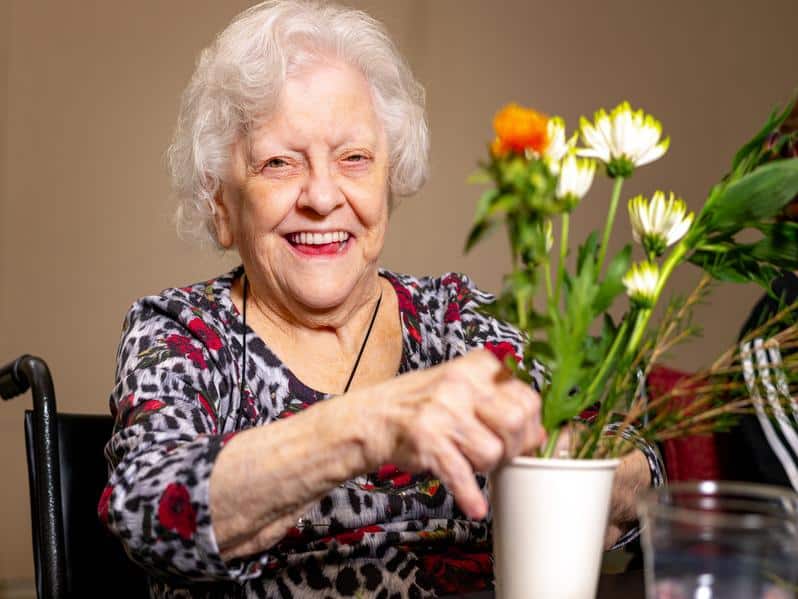
Though both assisted living and memory care communities provide compassionate, person-centered care to meet the unique needs of each individual, there are key differences between the two that make memory care better suited for adults with Alzheimer’s and other forms of dementia.
Learn the differences between these two levels of senior living and the signs your loved one could require professional dementia care, so you can confidently decide on which option is right for your family member.
What’s the Difference Between Assisted Living and Memory Care?
Assisted living is ideal for older adults who need help with activities of daily living (ADLs), which are essential tasks that must be completed each day for a high-quality life. ADLs include dressing, personal grooming, eating, and safely moving around your home and community.
While help is available from a professional caregiver 24/7 if needed, the overall goal of assisted living is to provide just the right amount of personalized assistance to help each resident maintain an independent lifestyle.
Memory care, also known as memory support assisted living, is a form of assisted living where residents receive personalized assistance with ADLs, plus 24-hour specialized care for older adults with Alzheimer’s disease and other forms of dementia. Residents are still encouraged to live as independently as possible, but their schedules are more structured, with several hours of dementia-based programming provided throughout each week.
Care Designed to Help Older Adults with Dementia Thrive
Though caregivers are available in assisted living whenever residents need them, memory care communities like ours at Village Shalom are designed to provide 24/7 supervised care to meet the unique needs of older adults with dementia.
These are a few benefits of memory care:
Smaller number of residents. Communities specializing in Alzheimer’s and dementia care typically have a smaller number of residents and a higher number of staff members than you would usually find in assisted living. This ensures each resident is getting the personalized, compassionate care they need and have more opportunities to build meaningful relationships with their neighbors.
Enhanced safety features. To keep residents safe and provide family members with peace of mind, many dementia care communities feature enhanced safety features that include secured entrances and courtyards, motion-sensored lighting, and restricted doorways disguised with curtains or artwork.
Intentional community layout. Most communities that specialize in caring for individuals with Alzheimer’s and other forms of dementia have simple layouts that are easy for residents to navigate. This allows those who may wander to do so safely and helps residents find their way to common areas and back home with less assistance.
Strategically placed décor. Personalized entrances to residences and unique décor throughout the community help residents make better connections with their home and common areas. This helps them move throughout the community independently and associate certain areas with certain events. For instance, a captivating painting of fruit may remind residents they’re near the dining area, and memory boxes tell residents they’ve arrived at their front door.
24-hour care. Village Shalom provides 24-hour licensed nursing care and specialized care plans tailored to each individual’s needs, preferences, and established life patterns. We also offer 40 hours or more of dementia-based programming per week, designed to promote cognitive health, encourage an independent lifestyle and help residents socialize.
Signs It’s Time for Specialized Care
Some seniors in the early stages of dementia can maintain an independent lifestyle in assisted living. However, older adults in the middle or late stages may require more comprehensive support. It’s difficult to know when it’s the right time for a higher level of care, because dementia symptoms can vary from day to day.
Here are common signs your loved one might require dementia care:
- Frequent falls, bruises or difficulty standing
- Unusual weight loss or weight gain
- Increased wandering or getting lost
- Social withdrawal
- No longer maintaining their living space
- Increased agitation or aggression that’s become difficult for family caregivers to manage
- Difficulty managing activities of daily living
- Incontinence
- Exhaustion from disrupted sleep patterns
Keep in mind there’s no one-size-fits-all formula for knowing when it’s the right time to move to a memory care community. If you think you or a loved one is experiencing symptoms of dementia, it’s best to seek the advice of your primary care provider or a cognitive health specialist.
Discover Compassionate Care and Vibrant Community at Village Shalom
Our senior living community in Overland Park, KS, features three 16-residence neighborhoods that feature all the comforts of home and whole-person care that honors each individual’s unique history, preferences, and interests. Contact Village Shalom to learn more about our community or schedule a visit. We’d love to get to know you!
